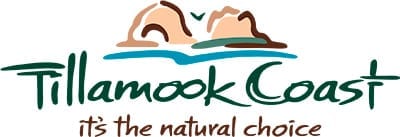Tillamook Coast Life Blog
Clamming on Oregon’s Tillamook Coast
We pulled into Kelly’s Brighton Marina at 7:20 on a Thursday morning. A marina with camping and RV sites, Kelly’s is a popular one-stop-shop destination for anyone interested in fishing or crabbing in the protected waters of the Nehalem Bay.
Kelly’s is easy to find. Located just of Highway 101 in Brighton, Oregon, a blip of a town about thirty miles north of Tillamook; look for the general store, cleaning stations, and docks leading down to a neat row of aluminum fishing boats with the word “Kelly’s” painted in red on a stripe of neon green.

We were interested in the experience of catching Dungeness crab, a species of crab indigenous to the cold waters of the Pacific Northwest (more about crabs in a bit). And while Kelly’s was happy to get us going on a crabbing adventure, our arrival time was at low tide and we happily agreed to begin our day with a bit of clamming instead.

With a shiny new Oregon shellfish license and a borrowed pail, shovel, and garden rakes, we drove south approximately ten miles to the town of Garibaldi and parked near the pier at 12th Street and Bay Lane. Anyone over the age of 14 is required to purchase and carry an Oregon shellfish license. As you might expect, the cost is lower for an in-state resident, but a three-day non-resident shellfish license will run you $11.50.

As this photo illustrates, we were basically clueless on how to harvest clams at the onset of our hunt. We quickly learned to watch what other clammers were doing and where they were having success. One tip is to look for breathing holes in the sand and to keep an eye out for spouts of water to randomly spray up from the depths of a clam bed (the more impressive the squirt, the deeper you will need to dig to find the clam). Another tip is to have cute kids and meet a friendly lady who takes pity on you and sneaks your youngest kid a clam when you aren’t looking.

That said…before leaving Kelly’s I took a reference photo of this chart on my smartphone. Each species of clam has a per/person harvest limit and each person is responsible for carrying their own catch. If you are looking to make the most of your clamming experience, and stay within the letter of the law (a serious responsibility for every sportsman, no matter your gender or age), my suggestion for you is to do a bit of pre-trip research from the comfort of your home.

The Oregon Department of Fish and Wildlife is an excellent resource and has published a plethora of information on fishing, crabbing, and clamming within the state of Oregon. Start here: Shellfish and continue to the “Fishing Resources” page: Sport Fishing Regulations. You’ll also find links to tide tables, instructional videos, suggested gear, and instructions on how to properly clean your catch.

A word of caution for anyone with children: pay attention to the incoming tide! In the Midwest we do not have tides and I was amazed at how quickly the water quite literally creeped up on us. One minute we were digging in the shallows and the next we were knee-deep in what I have just now realized were eel beds.

If you are feeling brave (and maybe not in bare feet), lift up one of the larger rocks and watch the crabs scurry away. We did see some of the smaller eels, maybe two or three inches long. Make sure you fill your clam bucket with fresh salt water before transporting them back to the cleaning station.
This photo shows the fruits of our labor, as you can see we found more of the closer-to-the-surface (i.e., easily raked up) steamer clams and did not come even close to the limits on any one species. Some of our shells were empty; that’s how we roll.

While we were crabbing (more about this later), our clams happily spit out sand in the circulating tanks at Kelly’s. Donating our catch to the greater good, Kelly gave a group of interested tourists a lesson in clam anatomy. For instance, did you know that the clam intestine is sometimes the happy home to a pair of male and female crabs? Surprise!

Kelly then steamed the clams and we enjoyed the meat. Hopefully my kids learned from this this “kill not, waste not” lesson and appreciated the idea that the kill was not for sport, but for food to sustain our bodies and develop a hunting technique that dates back to the native people who first settled this land. My youngest son even tried raw clam meat (the expression his face says it all).

Because we were staying in a nearby hotel without a kitchen, Kelly’s gave us the opportunity to eat fresh food without having to bring a stove and a pot or worry about sanitary cleaning and disposal. Again, we had no idea what we were doing and I’m glad I didn’t discover the stomach crabs by accident if you know what I mean.
And while we were happy to eat Tillamook Cheese and fly kites at Rockaway Beach, I can honestly say our favorite trip memories centered around clamming and crabbing. I fully anticipate my kids will write about this experience in their “what I did this summer” reports at the beginning of the next school year.
Plus, Kelly is a super nice guy with boundless energy. Take one look at his Facebook and Instagram pages and you’ll see what I mean. Happy trails!

